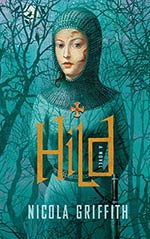
![]() shuff1
shuff1
10/8/2014
![]()
Nicola Griffith's Hild, tells the story of the life of Saint Hild before she became a saint. It follows Hild from shortly after her father (who was supposed to be king) is poisoned to when she is forcibly married to her bastard half-brother. After her mother has a vision of Hild being the Light of the World, Hild is forced to present herself as a mystical seer to her Uncle the King of Northumbria. Rumored to be a witch or a giantess, this precarious position leaves little room for friendships and plenty of room for secrets and assassination attempts.
Hild began as a quiet girl who liked observing things in nature, but was trained as her mother to watch and notice things in society as well. While Hild does appear to have prophetic dreams and visions, most of her prophecies appear to be observations of the world around her. The best part is that she is usually right. While she does not necessarily believe in any one god, she does believe in an ever changing pattern which connects every living thing, like a weave. But she's not just a seer. Towards the middle of the novel, she convinces her bastard half-brother to train her to defend herself. Since she is a woman, and forbidden to use a sword, she learns how to use an oak staff. Because of her strength, and the fact that she "took care" of a few bandits, she is largely feared as a woman who kills.
One of the most interesting aspects of the novel is Hild's experience with Christianity. She learns to read and write from and Irish priest at the behest of her uncle. This same priest will later be a confidant to the girl as she tries to maneuver through the ever changing politics of Northumbria. He later hides at the home of Hild's sister after he loses favor with the king, but still advises Hild with occasional letters delivered by other priests in hiding. When the king marries a Christian woman, Hild's mother and half-brother are baptized along with the king's newborn daughter. Her mother has trouble completely converting, as she still mentions praying to other gods to Hild.
Then there's the Crow. The Crow is the queen's bishop, who eventually baptizes the entire court, including the king and Hild. The Crow loaths the king's reliance on his seer, as the Christian God does not use prophecies. This leads to a very tense relationship as the two are rivals to the king's ear. He's also kind of a jerk, since he tries to forcibly baptize the whole country so that he could be Archbishop. This alienates the people from both Christianity and the king. Since this has the potential to cause unrest, Hild quickly puts a stop to it. As someone who will eventually be canonized as a saint, it's interesting to see the beginnings of her relationship to the Christian God.
While Hild was an historical figure, not much is known about her. Griffith was able to present her life in an imaginative way, that doesn't stray far from history. While Griffith states she is not a historian, the evidence that she's done her research is clear. The customs and traditions shown in the novel are accurate, and told in way that didn't leave the reader bored or disinterested. The need of a peace weaver is something mentioned in Beowulf and was important to the Germanic culture in Britain at this time. I highly recommend this book for anyone interested in Medieval literature.